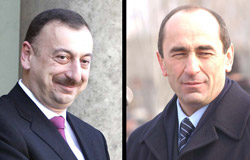Mann even said that it would be a tragedy if the conflict were not resolved during this year. Meanwhile, based on the opinions of both sides and the other OSCE co-chairmen, you get the impression that they are mostly content with the present situation. This all fits in if we consider the cosmopolitan changes going on. It’s obvious that the U.S. is getting more and more interested in allocating its forces in the Karabagh conflict zone, or north Iran, while Iran continues with its development of nuclear weapons. The U.S. can take this advantage and allocate the forces while the conflict negotiations go on. Thus, this progress will lead to the allocation of international peacekeeping forces in the zone.
Recently, representatives from Russian research groups have been analyzing the Karabagh conflict and what’s interesting is that all the analysts are of the opinion that Russia must become more active in resolving the Karabagh conflict peacefully, otherwise nothing will change. Meanwhile, we can assume that Russia is planning on having more influence in the conflict settlement simply because it wants to keep the “status quo”. Why? The reason is that any solution will lead to the allocation of international peacekeeping forces in the zone, which may reduce the influence that Russia has on the region as a whole.
Another fact is that both Russia and the third co-chairman country of the OSCE Minsk Group, France, are not too pleased with the policy that the U.S. adopted for Iran. That is why Iran is also in favor of “status quo”. Based on Armenia’s policy, Armenia is not rushing to resolve the conflict. As for Azerbaijan, it has always announced that it is trying its best to delay the conflict settlement. As a matter of fact, a couple of days ago, president of Azerbaijan Ilham Aliyev said the following on Turkish NTV television network:
“At the present, we have two options for settling the Karabagh conflict: either agree with the proposal which is not in favor of Azerbaijan, or wait until we get a proposal which favors Azerbaijan. I am for the second option.”
The president also said that the so-called “Parisian process”(referring to the negotiations in Rambuye) will serve as a means to come to terms because that “process” is yet another way to settle the conflict through stages. According to the president, Azerbaijan has not changed its orientation: Karabagh remains part of Azerbaijan. After all, the UN and the international community have recognized Azerbaijan’s territorial integrity.
“The conflict must be settled based on international norms. We can secure the Armenians living in Karabagh. However, there can be no negotiations regarding Azerbaijan’s territorial integrity. Karabagh is an inseparable part of Azerbaijan,” said I. Aliev.
Aliev also emphasized the fact that as of today, Azerbaijan’s budget is 4 times that of Armenia and it will exceed Armenia’s budget by 6 times next year.
“Armenia’s economy and army can’t compete with those of Azerbaijan,” said Ilham Aliev.
Right after these announcements, foreign minister of Azerbaijan Elmar Mamedyarov announced that Azerbaijan wants to continue negotiations with Armenia. Basically, it turns out that on the one hand, Azerbaijan is in favor of delaying the negotiation process and on the other hand, it wants to continue the process. In other words, the Azerbaijani authorities are saying that the negotiations are just an act and are content with that, which based on the abovementioned reasons, favors Armenia, Russia and France.
Let’s recall that just about a week ago, president of Karabagh Arkadi Ghukasyan said that the Karabagh conflict could not be settled without Karabagh and that the only way for Karabagh to participate in the negotiations is to exclude Armenia. The president of Karabagh surely would have consulted with the Armenian authorities before making such an announcement. What’s interesting is that right after that announcement, 16 NGOs made their announcements to the Armenian people. During his visit to Baku a couple of days ago, Russian president Vladimir Putin announced that he plans on inviting the president of Armenia to Moscow for consultations regarding the Karabagh conflict. This all forms the “technical part” of the “status quo”. Basically, this is an attempt to show the U.S., as well as the international community, that some issues are being discussed. Also, this shows the world that there are some disagreements between Armenia and Azerbaijan on some principles and that both sides may come to terms after some consultations. However, this will not sound too convincing to the U.S. The U.S. may ask the following question: why didn’t Armenia think about that 7-8 years ago and review the negotiations? Why did the Karabagh authorities suddenly decide that it would be better to have Armenia not take part in the negotiations?
The main thing here is that neither of the conflicting sides wants to settle the conflict anytime soon and each side is busy with pretending to negotiate.

